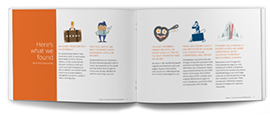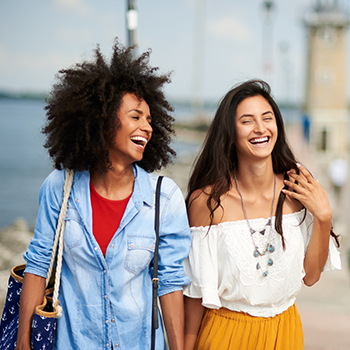Need fresh thinking? Help is a few keystrokes away.
U.S. LGBT Consumer Travel Market Moves Mainstream
New York City, San Francisco and Key West, step aside. Smaller cities such as Nashville and Rehoboth Beach, Del., have joined the ranks of the top-20 stateside travel destinations for the LGBT community. And that means more opportunity for every city in America—if it is willing to put forth the effort to welcome them.
Why target LGBT consumer travelers?
Sure, economic powerhouses such as Fort Lauderdale will continue to draw 1.5 million LGBT tourists each year spending $1.5 billion while there. Provincetown, Mass., will remain a “must-see” city as will host cities where major pride conferences, parades and other social events are well established. But as LGBT legislation, the media and consumer perceptions and attitudes become more gay friendly, the growth opportunity is ripe for hotels and resorts.
First identified as a highly desirable consumer market segment after LGBT travelers failed to let 9/11 travel trends slow them down when others were staying home, it’s a target that’s also coming into its own.
- 3 to 7 percent of the population identifies as LGBT or with the LGBTQ community
- Collective $917 billion annual buying power (disposable income)
- The LGBT friendly market has grown from “emerging” in 2016 to nearly mature in 2019
It’s anticipated that by 2020 or 2022 that the domestic market for LGBT travel will be on par with the fully mature market already established in Europe. Growth has been largely fueled by legalization normalizing same-sex marriage, giving it global recognition across 70 countries where marriage equality has become a reality—including the United States.
LGBT consumer travel motivations are diverse
The reasons members of the LGBT community travel are as diverse as LGBT people themselves. Survey respondents have shared a variety of viewpoints with LGBT organizations such as The International Gay & Lesbian Travel Association (IGLTA). Founded in 1983, the IGLTA describes itself as “the leading member-based global organization dedicated to LGBT tourism and a proud Affiliate Member of the United Nations World Tourism Organization.”
Much has changed since the first UNWTO Global Report on LGBT Tourism was published in 2012, when gay marriage was not as widely accepted as it is now. A second report released in 2017 revealed that single gay travelers are more likely to travel alone than lesbian women, and they tend to spend more lavishly in the cities they visit than their female counterparts. LGBT women are more likely than LGBT men to travel with children, although male same-sex couples do take family vacations as well.
Additionally, some common motivators within the LGBT consumer travel market include:
- Staging destination weddings in gay-friendly locations
- Celebrating honeymoons where the couple can remain open about their relationship
- Visiting LGBT-friendly neighborhoods for pubs, clubs, restaurants and businesses which cater to their interests
- Taking family vacations, sometimes including multi-generational trips
- Attending or participating in Pride parades, conferences or events
- Visiting LGBT friends
- Meeting up with non-local LGBTs discovered through travel industry or dating apps, social media, online forums, etc.
Yes, LGBT travelers still want to be courted
As governments, businesses and consumer perceptions and attitudes become more inclusive, LGBT travelers are becoming more visible—and less visible—all at the same time.
That’s because the more mainstream it becomes to travel with a same-sex or transgender partner, the less likely it is for such guests to hide their sexual identities from hotels who wish to earn their business. When LGBT people feel safe enough to self-identify at specific destinations, hotels, in turn, can reach out to them with marketing packages to make them feel comfortable.
As the LGBT community grows, however, same-sex, bisexual and transgender couples are beginning to blend in with their non-LGBT counterparts as they are increasingly accepted within society. They do want LGBT equality. They don’t want to be seen as “special” or “different” when it comes to being a guest in your hotel.
That doesn’t mean they want to disappear from view.
Yes, do put in the time to create marketing geared toward their interests. Diversify your photo library so it doesn’t focus solely on heterosexual couples. Consider creating a mini-site within your main website with information on LGBT-friendly businesses in the area, seasonal events of particular interest to them and a campaign with discounted rates tied to Gay Pride events.
When LGBT couples, guests or families arrive, don’t make them feel like they are any less valued than any other guest in your hotel, but don’t make an overt fuss over them, either. Follow their lead when it comes to preferred titles and pronouns, but don’t overemphasize it. Doing so can have the opposite effect of what you intended.
LGBT millennials are the exception
Millennials are more likely to have grown up accepting the LGBT community and expect others to be welcoming in return. They do respond to marketing campaigns and public relations efforts sponsored by hotels and resorts which pride themselves in being gay-friendly but aren’t moved by campaigns which single them out as different.
Instead, focus on communicating why any millennial, regardless of sexual preference or orientation, would enjoy doing business with your brand. As a group, millennials tend to focus on adventure travel, cultural authenticity and local experiences, so those are great places to start.
That doesn’t mean they don’t also look for opportunities to participate in LGBT events. It's okay to show your openness to diversity with gay pride. You'll have to develop a strategy more than adding a rainbow flag overlay to your hotel chain logo, however, and you don’t want your creative or your people to overdo it.
Take a cue from LGBT-friendly brands
You don't have to be an international brand for your local tourism industry to compete in this niche market. You just need to create a voice, and use it.
For example, begin by being an influencer within municipal committees, chambers of commerce and other organizations. Build support for new business opportunities geared toward LGBT people such as being supportive of pubs or bars in their efforts to be more welcoming to all, including bisexual, transgender and intersex guests who might not fit strictly within LGBT.
Advertising to expand the economic impact of the LGBT community on your local hospitality industry will enhance your community as a whole. Early adopters who reach out to the gay and lesbian community as well as the transgender community with destination marketing campaigns can expect positive responses to their ads, regardless of the sexual orientation of the audience.
A few notable examples include:
- Marriott: The brand’s “Love Travels" campaign took it from No. 5 in 2009 to No. 1 in 2015 by successfully capturing the gay community and the lesbian community.
- Hilton: Known for its “Stay Hilton. Go Out." campaign, Hilton is stragetically partnered with the former Gay and Lesbian Alliance Against Defamation now known simply as GLAAD, The Human Rights Campaign, International Gay and Lesbian Travel Association (IGLTA®), Matthew Shepard Foundation and the National LGBT Chamber of Commerce (NGLCC).
- Key West: So well-known for being gay-friendly that it might not feel welcoming to those who are non-LGBT, the city launched an "All Welcome" campaign. The message is that the area is all-inclusive, regardless of sexual orientation.
- Commune Hotels & Resorts: This brand sponsors Gay Pride events including the annual San Francisco Pride celebration and offers packages each summer for New York City's Pride festival in June.
- Preferred Hotels: Preferred Pride hosts a mini-site featuring LGBT-friendly properties. The brand is partnered with TAG Approved® (which grades properties for being friendly to the gay community) and with IGLTA.
Need help?
LAVIDGE has worked with hotel companies for more than 30 years on branding through publicity and advertising. We are experts in crafting the perfect multicultural marketing campaign to boost the economic impact of diverse market segments on your bottom line. We’ve helped a national QSR chain, for example, successfully reach the Hispanic market. We can help you too.
To learn more, give us a call at 480.998.2600 or send email to [email protected].
Access More LGBT Hotel Marketing Resources
Need additional marketing insights? Here is a roundup of resources, both current and historical for perspective. Some are available immediately online for at no cost. Others are available for purchase from online bookstores.
- UN World Tourism Organization Second Report on LGBT Tourism (2017)
- The Handbook of LGBT Tourism and Hospitality (2017)
- Hotelier Academy: LGBT Travel Audience | How to reach more gay and lesbian hotel guests (2017)
- 12 LGBT-Friendly Hotel Brands in the U.S. (2016)
- Gay and Lesbian Tourism: The Essential Guide for Marketing / Edition 1 by Jeff Guaracino (2007)
2019 Southwest Hospitality Industry Marketing Report

This article is a brief abstract of our exclusive and authoritative study that takes the guesswork out of hospitality advertising and marketing. Rather than speculating about what will drive consumers to action, we've asked them.



